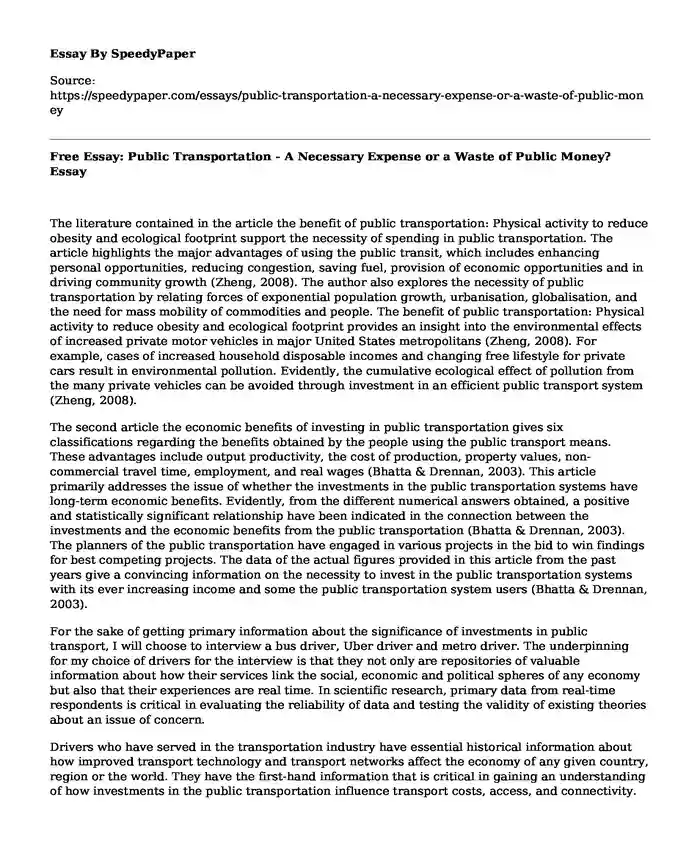
| Type of paper: | Essay |
| Categories: | Government Public policy |
| Pages: | 3 |
| Wordcount: | 675 words |
The literature contained in the article the benefit of public transportation: Physical activity to reduce obesity and ecological footprint support the necessity of spending in public transportation. The article highlights the major advantages of using the public transit, which includes enhancing personal opportunities, reducing congestion, saving fuel, provision of economic opportunities and in driving community growth (Zheng, 2008). The author also explores the necessity of public transportation by relating forces of exponential population growth, urbanisation, globalisation, and the need for mass mobility of commodities and people. The benefit of public transportation: Physical activity to reduce obesity and ecological footprint provides an insight into the environmental effects of increased private motor vehicles in major United States metropolitans (Zheng, 2008). For example, cases of increased household disposable incomes and changing free lifestyle for private cars result in environmental pollution. Evidently, the cumulative ecological effect of pollution from the many private vehicles can be avoided through investment in an efficient public transport system (Zheng, 2008).
The second article the economic benefits of investing in public transportation gives six classifications regarding the benefits obtained by the people using the public transport means. These advantages include output productivity, the cost of production, property values, non-commercial travel time, employment, and real wages (Bhatta & Drennan, 2003). This article primarily addresses the issue of whether the investments in the public transportation systems have long-term economic benefits. Evidently, from the different numerical answers obtained, a positive and statistically significant relationship have been indicated in the connection between the investments and the economic benefits from the public transportation (Bhatta & Drennan, 2003). The planners of the public transportation have engaged in various projects in the bid to win findings for best competing projects. The data of the actual figures provided in this article from the past years give a convincing information on the necessity to invest in the public transportation systems with its ever increasing income and some the public transportation system users (Bhatta & Drennan, 2003).
For the sake of getting primary information about the significance of investments in public transport, I will choose to interview a bus driver, Uber driver and metro driver. The underpinning for my choice of drivers for the interview is that they not only are repositories of valuable information about how their services link the social, economic and political spheres of any economy but also that their experiences are real time. In scientific research, primary data from real-time respondents is critical in evaluating the reliability of data and testing the validity of existing theories about an issue of concern.
Drivers who have served in the transportation industry have essential historical information about how improved transport technology and transport networks affect the economy of any given country, region or the world. They have the first-hand information that is critical in gaining an understanding of how investments in the public transportation influence transport costs, access, and connectivity. These variables in transportation are major determinants of economic growth and enhancing the accessibility of formerly isolated areas to people and economic activity. The questions that I will administer to this population are as follows.
Sample Questions for interviews
Do you think that public transportation is beneficial?
In what ways do public transportation help the society?
How does an efficient public transportation system contribute to economic development of a place?
Do you think that investments in the public transportation sector are worth the returns?
What are the advantages of public transportation as compared to the private transportation?
Is there a fair market for investments in the public transport?
Given another chance to decide, whether to work in public or the private transportation sector, which would be your choice? Why would you choose it?
In most developed countries, both public and private transportation are adequately developed. How does this cumulatively contribute to the economy?
References
Bhatta, S., & Drennan, M. (2003). The economic benefits of public investment in transportation: A review of recent literature. Journal of Planning Education and Research, 22(3), 288-29
Zheng, Y. (2008). The benefit of public transportation: Physical activity to reduce obesity and ecological footprint. Preventive Medicine, 46(1), 4-5.
Cite this page
Free Essay: Public Transportation - A Necessary Expense or a Waste of Public Money?. (2019, Nov 11). Retrieved from https://speedypaper.net/essays/public-transportation-a-necessary-expense-or-a-waste-of-public-money
Request Removal
If you are the original author of this essay and no longer wish to have it published on the SpeedyPaper website, please click below to request its removal:
- Free Essay on Universal Health Care at SpeedyPaper
- Essay Example on Seclusion and Restraint in Psychiatric Hospitals
- Chain of 20 Restaurants - Social Media Marketing Free Essay
- Performance Review as a Supervisor. Free Essay.
- Free Essay Sample on American Presidential Elections
- Free Essay in Americah History: Underground Rail Road
- Essay Sample. Analysis of Feral, North Carolina 1965
Popular categories




